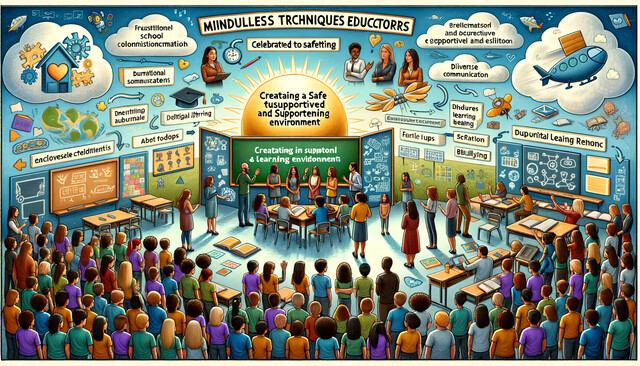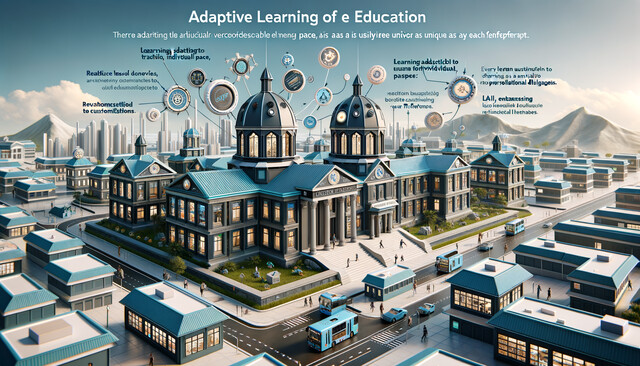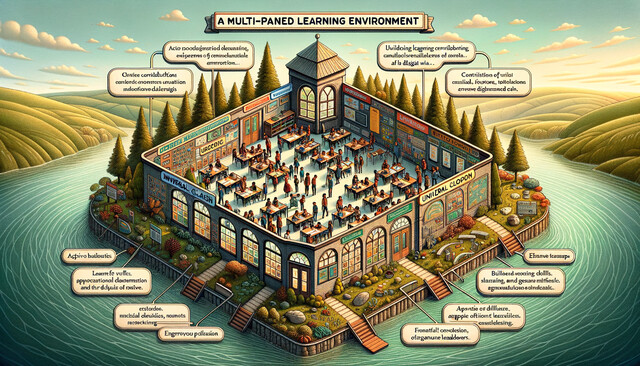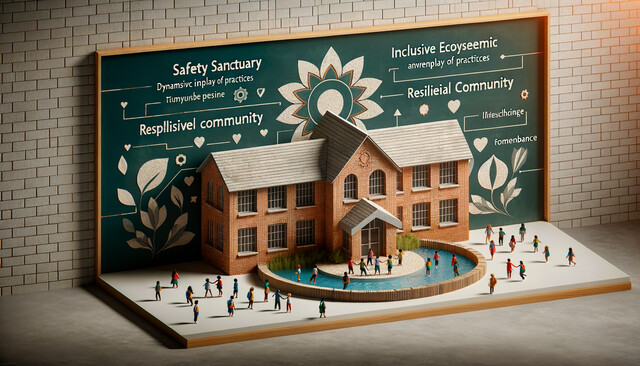Online Class: Peer Mediation and Conflict Resolution

no certificate
with CEU Certificate*
-
15Lessons
-
22Exams &
Assignments -
6Hours
average time -
0.6CEUs
Course Description
Imagine a world where conflicts are not an overwhelming force but a dynamic opportunity for growth, connection, and meaningful change. Picture yourself equipped with the skills to turn discord into harmony and misunderstandings into mutual understanding. Welcome to the "Peer Mediation and Conflict Resolution" course�a journey that ventures beyond conventional learning to transform you into a catalyst for positive change.
In today's fast-paced and interconnected world, conflicts arise in many shapes and forms, and possessing the ability to navigate them with grace and empathy is more crucial than ever. This course is your key to unlocking the hidden potential within every challenge, turning obstacles into stepping stones toward collaboration and peace. It's not just a course; it's an invitation to reshape the fabric of your interactions, relationships, and communities.
From the very first moment, you'll sense the difference in our approach. This isn't about rote learning or theoretical paradigms; it's about fostering a profound shift in how you engage with the world around you. By participating in peer mediation, you will not only gain powerful interpersonal skills but also ignite a movement of change within your community. Imagine being the go-to person who others seek out during tumultuous times, knowing you possess the unique ability to provide a safe and confidential space for open dialogue and mutual respect.
At the heart of our program lies the art of dialogue�mastering the delicate dance of listening and speaking. Through captivating stories, interactive scenarios, and hands-on practice, you'll delve into the intricacies of nonverbal communication and reflective listening. These are not just skills; they are life-altering experiences that will empower you to bridge even the widest chasms of misunderstanding, paving the way for solutions that resonate with everyone involved.
Our course invites you to explore the dynamic labyrinth of conflict types, from interpersonal tensions to complex intergroup dynamics. You'll discover tools and strategies that go beyond surface resolutions, transforming challenges into opportunities for growth and cohesion. Your journey will be guided by empathy, the heartbeat of effective mediation, ensuring that every interplay is infused with genuine understanding and compassion.
What sets this course apart is its unique focus on cultural fluency and negotiation. As a participant, you'll emerge as a cultural navigator, masterfully transcending boundaries and creating bridges where none existed. Our curriculum honors the rich tapestry of human experience, equipping you with the skills to appreciate diverse perspectives and integrate them into comprehensive solutions. You'll master the art of discerning interests beneath surface positions, elevating conflicts from contentious standoffs to empathetic exchanges.
This course goes beyond traditional boundaries to address modern conflicts like cyberbullying, offering insights into digital realms where anonymity amplifies challenges. By analyzing the dynamics of cyber conflicts, you'll learn to cultivate robust digital well-being strategies, preparing you to face contemporary issues with confidence and competence.
And as the digital age reshapes how we communicate, we'll also guide you through harnessing technology to enrich mediation practices, utilizing real-time feedback and adaptability to enhance outcomes. You'll learn to lead with emotional intelligence and active listening, transforming not just conflicts but entire environments into spaces of constructive dialogue and mutual respect.
This course isn't just about acquiring a skill set; it's about embracing a transformational mindset. You'll leave not just as a trained mediator but as a leader who inspires positive change and enduring peace. Why settle for simply resolving conflicts when you can transcend them and spark lasting connections?
Join us in the "Peer Mediation and Conflict Resolution" course, where the power of empathy and the art of negotiation converge to create a more peaceful and collaborative world. This is not just a learning experience�it's a journey that will forever change how you interact with the world. Enroll today and step into a role that will redefine not only your life but the lives of those around you. The world needs bridge builders like you now more than ever.
- Completely Online
- Self-Paced
- 6 Months to Complete
- 24/7 Availability
- Start Anytime
- PC & Mac Compatible
- Android & iOS Friendly
- Accredited CEUs

Course Lessons
Lesson 1. Creating a Safe Space for Resolution: Confidentiality and Trust in Peer Mediation
 Review Practice Worksheet: Lesson-1-Downloadable-16434.pdf
Review Practice Worksheet: Lesson-1-Downloadable-16434.pdf Lesson discussions: Reasons for Taking this Course
Lesson discussions: Reasons for Taking this Course Assessment: Lesson 1 Review Exam
Assessment: Lesson 1 Review Exam
Lesson 2. Bridging Differences: Mastering Active Listening and Nonverbal Communication for Harmonious Dialogue
 Review Practice Worksheet: Lesson-2-WordSearch-16436.pdf
Review Practice Worksheet: Lesson-2-WordSearch-16436.pdf Complete: Lesson 2 Activity
Complete: Lesson 2 Activity Assessment: Lesson 2 Review Exam
Assessment: Lesson 2 Review Exam
Lesson 3. Navigating the Labyrinth of Conflict: A Deep Dive into Interpersonal, Intragroup, and Intergroup Dynamics
 Review Practice Worksheet: Lesson-3-Downloadable-16438.pdf
Review Practice Worksheet: Lesson-3-Downloadable-16438.pdf Complete: Lesson 3 Activity
Complete: Lesson 3 Activity Assessment: Lesson 3 Review Exam
Assessment: Lesson 3 Review Exam
Lesson 4. Empathy: The Heartbeat of Effective Peer Mediation
 Review Practice Worksheet: Lesson-4-WordSearch-16439.pdf
Review Practice Worksheet: Lesson-4-WordSearch-16439.pdf Complete: Lesson 4 Activity
Complete: Lesson 4 Activity Assessment: Lesson 4 Review Exam
Assessment: Lesson 4 Review Exam
Lesson 5. Conflict Resolution Skills: Empathy, Communication, Action
 Review Practice Worksheet: Lesson-5-WorkSheet-16441.pdf
Review Practice Worksheet: Lesson-5-WorkSheet-16441.pdf Assessment: Lesson 5 Review Exam
Assessment: Lesson 5 Review Exam
Lesson 6. The Power and Principles of Peer Mediation: Fostering Conflict Resolution and Collaboration
 Review Practice Worksheet: Lesson-6-WorkSheet-16443.pdf
Review Practice Worksheet: Lesson-6-WorkSheet-16443.pdf Assessment: Lesson 6 Review Exam
Assessment: Lesson 6 Review Exam
Lesson 7. Understanding Cultural Nuances for Effective Conflict Resolution
 Review Practice Worksheet: Lesson-7-Downloadable-16444.pdf
Review Practice Worksheet: Lesson-7-Downloadable-16444.pdf Complete: Lesson 7 Activity
Complete: Lesson 7 Activity Assessment: Lesson 7 Review Exam
Assessment: Lesson 7 Review Exam
Lesson 8. Unveiling Negotiation: Mastering the Concepts of Interests vs. Positions
 Review Practice Worksheet: Lesson-8-Activity-16446.pdf
Review Practice Worksheet: Lesson-8-Activity-16446.pdf Complete: Lesson 8 Activity
Complete: Lesson 8 Activity Assessment: Lesson 8 Review Exam
Assessment: Lesson 8 Review Exam
Lesson 9. Decoding Bullying Dynamics: Pathways to Resolution
 Review Practice Worksheet: Lesson-9-WorkSheet-16448.pdf
Review Practice Worksheet: Lesson-9-WorkSheet-16448.pdf Complete: Lesson 9 Activity
Complete: Lesson 9 Activity Assessment: Lesson 9 Review Exam
Assessment: Lesson 9 Review Exam
Lesson 10. Building Bridges: Mediators as Cultural Navigators in a Globalized World
 Review Practice Worksheet: Lesson-10-HomeWork-16450.pdf
Review Practice Worksheet: Lesson-10-HomeWork-16450.pdf Complete: Lesson 10 Activity
Complete: Lesson 10 Activity Assessment: Lesson 10 Review Exam
Assessment: Lesson 10 Review Exam
Lesson 11. Privacy in Mediation
 Review Practice Worksheet: Lesson-11-WordSearch-16451.pdf
Review Practice Worksheet: Lesson-11-WordSearch-16451.pdf Assessment: Lesson 11 Review Exam
Assessment: Lesson 11 Review Exam
Lesson 12. The Complex World of Cyber Conflicts: Understanding Types, Causes, and Dynamics
 Review Practice Worksheet: Lesson-12-Downloadable-16454.pdf
Review Practice Worksheet: Lesson-12-Downloadable-16454.pdf Assessment: Lesson 12 Review Exam
Assessment: Lesson 12 Review Exam
Lesson 13. Understanding Participant Satisfaction and Agreement Durability
 Review Practice Worksheet: Lesson-13-WordSearch-16456.pdf
Review Practice Worksheet: Lesson-13-WordSearch-16456.pdf Assessment: Lesson 13 Review Exam
Assessment: Lesson 13 Review Exam
Lesson 14. Leadership in Mediation: Cultivating Influence Over Authority
 Review Practice Worksheet: Lesson-14-WordSearch-16458.pdf
Review Practice Worksheet: Lesson-14-WordSearch-16458.pdf Assessment: Lesson 14 Review Exam
Assessment: Lesson 14 Review Exam
Lesson 15. Peer Mediation: Empathy-Driven Solutions for School Conflicts
 Review Practice Worksheet: Lesson-15-WordSearch-16460.pdf
Review Practice Worksheet: Lesson-15-WordSearch-16460.pdf Lesson discussions: End of Course Poll; Course Comments
Lesson discussions: End of Course Poll; Course Comments Assessment: Lesson 15 Review Exam
Assessment: Lesson 15 Review Exam
Learning Outcomes
- Demonstrate the ability to actively listen, ensuring all parties feel understood and respected during peer mediation sessions.
- Identify and apply conflict resolution strategies, including brainstorming and collaborative problem-solving, to facilitate dialogue and achieve mutually satisfactory outcomes.
- Identify nonverbal cues, such as facial expressions and gestures, during conflict resolution to better understand underlying emotions and improve communication effectiveness.
- Demonstrate the ability to apply reflective and empathic listening techniques to facilitate constructive dialogue during a peer mediation session.
- Define interpersonal, intragroup, and intergroup conflict, citing specific examples for each type
- Demonstrate empathetic listening techniques to navigate interpersonal conflicts by practicing active listening, validating perspectives, and restating others' thoughts
- Demonstrate the ability of empathetic mediators to comprehend and address emotional subtleties without judgment, fostering an atmosphere of mutual respect and understanding
- Describe the role of role-playing exercises in developing empathy and understanding diverse perspectives during peer mediation scenarios
- Identify techniques, such as active listening and emotional intelligence, that mediators can use to promote empathy-driven conflict resolution strategies
- Recognize the impact of non-verbal communication cues like body language and facial expressions in mediating conflicts and fostering trust among parties involved
- Define how empathy enhances interpersonal relationships by facilitating trust and open communication in peer mediation
- Define and explain the root causes of conflicts within personal, relational, structural, and cultural domains and their impact on mediation outcomes.
- Demonstrate effective communication techniques, including active listening and emotional regulation, in peer mediation scenarios to foster empathy and collaborative solutions.
- Demonstrate mastery of lesson content at levels of 70% or higher.
Additional Course Information

- Document Your Lifelong Learning Achievements
- Earn an Official Certificate Documenting Course Hours and CEUs
- Verify Your Certificate with a Unique Serial Number Online
- View and Share Your Certificate Online or Download/Print as PDF
- Display Your Certificate on Your Resume and Promote Your Achievements Using Social Media

Choose Your Subscription Plan
No Certificate / No CEUs
This course only
| Includes certificate | X |
| Includes CEUs | X |
| Self-paced |

|
| Instructor support |

|
| Time to complete | 6 months |
| No. of courses | 1 course |
Certificate & CEUs
This course only
| Includes certificate |

|
| Includes CEUs |

|
| Self-paced |

|
| Instructor support |

|
| Time to complete | 6 months |
| No. of courses | 1 course |
Certificates & CEUs
Includes all 600+ courses
| Includes certificate |

|
| Includes CEUs |

|
| Self-paced |

|
| Instructor support |

|
| Time to complete | 12 Months |
| No. of courses | 600+ |
Certificates & CEUs
Includes all 600+ courses
| Includes certificate |

|
| Includes CEUs |

|
| Self-paced |

|
| Instructor support |

|
| Time to complete | 24 Months |
| No. of courses | 600+ |
Related Courses
-
 5 hours
0.5 CEUs
Mindfulness Techniques for Educators
+ More Info
5 hours
0.5 CEUs
Mindfulness Techniques for Educators
+ More Info
-
 3 hours
0.3 CEUs
Effective Teaching Strategies for Diverse Classrooms
+ More Info
3 hours
0.3 CEUs
Effective Teaching Strategies for Diverse Classrooms
+ More Info
-
 4 hours
0.4 CEUs
Utilizing Open Educational Resources
+ More Info
4 hours
0.4 CEUs
Utilizing Open Educational Resources
+ More Info
-
 3 hours
0.3 CEUs
Preparing Students for Careers of the Future
+ More Info
3 hours
0.3 CEUs
Preparing Students for Careers of the Future
+ More Info
-
 7 hours
0.7 CEUs
Integrating Arts into the Curriculum
+ More Info
7 hours
0.7 CEUs
Integrating Arts into the Curriculum
+ More Info
-
 7 hours
0.7 CEUs
Strategies for Closing the Achievement Gap
+ More Info
7 hours
0.7 CEUs
Strategies for Closing the Achievement Gap
+ More Info
-
 4 hours
0.4 CEUs
Enhancing Student Engagement and Motivation
+ More Info
4 hours
0.4 CEUs
Enhancing Student Engagement and Motivation
+ More Info
-
 3 hours
0.3 CEUs
Designing STEM Curriculum
+ More Info
3 hours
0.3 CEUs
Designing STEM Curriculum
+ More Info
-
 3 hours
0.3 CEUs
Collaborative Teaching Approaches
+ More Info
3 hours
0.3 CEUs
Collaborative Teaching Approaches
+ More Info
-
 6 hours
0.6 CEUs
Differentiated Instruction Techniques
+ More Info
6 hours
0.6 CEUs
Differentiated Instruction Techniques
+ More Info
-
 7 hours
0.7 CEUs
Integrating Technology in Education
+ More Info
7 hours
0.7 CEUs
Integrating Technology in Education
+ More Info
-
 5 hours
0.5 CEUs
Developing Critical Thinking Skills
+ More Info
5 hours
0.5 CEUs
Developing Critical Thinking Skills
+ More Info
-
 7 hours
0.7 CEUs
Introduction to Instructional Design
+ More Info
7 hours
0.7 CEUs
Introduction to Instructional Design
+ More Info
-
 4 hours
0.4 CEUs
Gamification in Education
+ More Info
4 hours
0.4 CEUs
Gamification in Education
+ More Info
-
 5 hours
0.5 CEUs
Implementing School-Wide Literacy Programs
+ More Info
5 hours
0.5 CEUs
Implementing School-Wide Literacy Programs
+ More Info
-
 6 hours
0.6 CEUs
Adaptive Learning Technologies
+ More Info
6 hours
0.6 CEUs
Adaptive Learning Technologies
+ More Info
-
 6 hours
0.6 CEUs
Narrative Approaches in Education
+ More Info
6 hours
0.6 CEUs
Narrative Approaches in Education
+ More Info
-
 7 hours
0.7 CEUs
Leadership in Educational Settings
+ More Info
7 hours
0.7 CEUs
Leadership in Educational Settings
+ More Info
-
 5 hours
0.5 CEUs
Understanding Educational Neuroscience
+ More Info
5 hours
0.5 CEUs
Understanding Educational Neuroscience
+ More Info
-
 6 hours
0.6 CEUs
Professional Learning Communities Development
+ More Info
6 hours
0.6 CEUs
Professional Learning Communities Development
+ More Info
-
 4 hours
0.4 CEUs
The Role of Feedback in Student Learning
+ More Info
4 hours
0.4 CEUs
The Role of Feedback in Student Learning
+ More Info
-
 6 hours
0.6 CEUs
Building Effective Parent-Teacher Partnerships
+ More Info
6 hours
0.6 CEUs
Building Effective Parent-Teacher Partnerships
+ More Info
-
 3 hours
0.3 CEUs
Empowering Students through Self-Assessment
+ More Info
3 hours
0.3 CEUs
Empowering Students through Self-Assessment
+ More Info
-
 3 hours
0.3 CEUs
Effective Literacy Instruction in Early Education
+ More Info
3 hours
0.3 CEUs
Effective Literacy Instruction in Early Education
+ More Info
-
 7 hours
0.7 CEUs
Aligning Curriculum with State Standards
+ More Info
7 hours
0.7 CEUs
Aligning Curriculum with State Standards
+ More Info
-
 4 hours
0.4 CEUs
Implementing Project-Based Learning
+ More Info
4 hours
0.4 CEUs
Implementing Project-Based Learning
+ More Info
-
 5 hours
0.5 CEUs
Creating a Safe and Supportive Learning Environment
+ More Info
5 hours
0.5 CEUs
Creating a Safe and Supportive Learning Environment
+ More Info
-
 5 hours
0.5 CEUs
Inquiry-Based Learning Strategies
+ More Info
5 hours
0.5 CEUs
Inquiry-Based Learning Strategies
+ More Info
-
 4 hours
0.4 CEUs
Innovative Curriculum Design for the 21st Century
+ More Info
4 hours
0.4 CEUs
Innovative Curriculum Design for the 21st Century
+ More Info
-
 3 hours
0.3 CEUs
Education Policy and Reform: Impact and Implications
+ More Info
3 hours
0.3 CEUs
Education Policy and Reform: Impact and Implications
+ More Info
-
 6 hours
0.6 CEUs
Social and Emotional Learning: Programs and Practices
+ More Info
6 hours
0.6 CEUs
Social and Emotional Learning: Programs and Practices
+ More Info
-
 7 hours
0.7 CEUs
Understanding Adolescent Development
+ More Info
7 hours
0.7 CEUs
Understanding Adolescent Development
+ More Info
-
 5 hours
0.5 CEUs
Building Inclusive Classrooms
+ More Info
5 hours
0.5 CEUs
Building Inclusive Classrooms
+ More Info
-
 5 hours
0.5 CEUs
Engaging Families in the Educative Process
+ More Info
5 hours
0.5 CEUs
Engaging Families in the Educative Process
+ More Info
-
 6 hours
0.6 CEUs
Leadership Skills for Instructional Coaches
+ More Info
6 hours
0.6 CEUs
Leadership Skills for Instructional Coaches
+ More Info
-
 5 hours
0.5 CEUs
Utilizing Data to Drive Instruction
+ More Info
5 hours
0.5 CEUs
Utilizing Data to Drive Instruction
+ More Info
-
 5 hours
0.5 CEUs
STEAM: Integrating the Arts with STEM
+ More Info
5 hours
0.5 CEUs
STEAM: Integrating the Arts with STEM
+ More Info
-
 5 hours
0.5 CEUs
Implementing Evidence-Based Practices
+ More Info
5 hours
0.5 CEUs
Implementing Evidence-Based Practices
+ More Info




